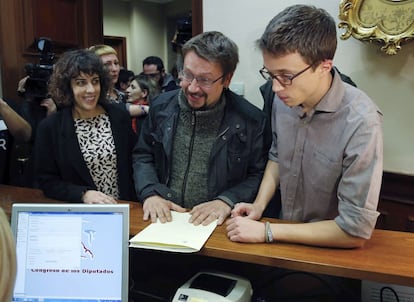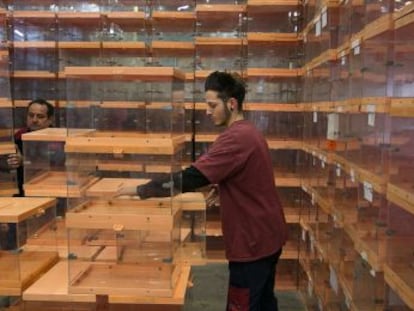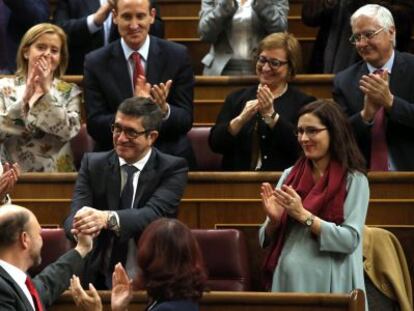Podemos and Socialists overcome key difference blocking governing deal
Anti-austerity party agrees to have just one parliamentary group in Congress

One of the biggest hurdles to a potential governing alliance between Spain’s Socialist Party (PSOE) and Podemos has been cleared.
The anti-austerity party and its three associates in Valencia, Galicia and Catalonia have finally agreed to integrate into a single parliamentary group, rather than seek four separate delegations.
Podemos’s regional partners had, until now, demanded a separate presence in Spain’s Congress, a petition that, if granted, would have meant greater subsidies and a bigger representation on house committees.
Compromís, the Valencian party that ran in tandem with Podemos, decided to reject the deal and file a separate request for a group of its own
But other parties in the lower house rejected this demand, pointing to internal regulations that state that deputies cannot create separate groups if “at the time of the election, they belonged to political entities that did not compete against each other for votes.”
The deal came shortly before the deadline to file the petitions for congressional groups on Tuesday.
But four deputies for Compromís, the Valencian party that ran in tandem with Podemos at the December 20 election, decided to reject the deal and file a separate request for a group of its own.
This means that the Podemos group in Congress will have 65 representatives, rather than the 69 originally attributed to the anti-austerity party after the election.
Compromís deputy Joan Baldoví acknowledged that its alliance with Podemos was “broken,” but insisted that any other choice would have meant betraying its own electorate. “We kept our promise to Valencian voters,” he said.
Podemos’s decision to accept a single congressional group eliminates one of the hurdles in the way of an alliance with the Socialists. The latter’s leader, Pedro Sánchez, is aiming for a coalition of progressive forces to form an alternative government to the conservative Popular Party (PP), which won the most seats at the election (123).
But other sticking points remain, not least of which is Podemos’s support for a referendum on self-rule in Catalonia – an option that the Socialist Party has so far rejected as energetically as the PP.
Íñigo Errejón, the number two official at Podemos, warned that despite the recent deal, Sánchez should not take it for granted that he will find support for a bid to the prime minister’s office.
“If he wants to be prime minister of Spain, the first thing he needs to do is explain what for, and maybe he will find some form of support,” he said.
Following an inconclusive election in which no party achieved a sufficiently significant majority to form a government, Spain’s parties have been scrambling to strike deals that will allow them to take power and avert new elections. Acting Prime Minister Mariano Rajoy, of the PP, will seek reinstatement at the upcoming investiture vote, but has few chances of being successful as his party fell short of the 176 seats required for a congressional majority.
English version by Susana Urra.
Tu suscripción se está usando en otro dispositivo
¿Quieres añadir otro usuario a tu suscripción?
Si continúas leyendo en este dispositivo, no se podrá leer en el otro.
FlechaTu suscripción se está usando en otro dispositivo y solo puedes acceder a EL PAÍS desde un dispositivo a la vez.
Si quieres compartir tu cuenta, cambia tu suscripción a la modalidad Premium, así podrás añadir otro usuario. Cada uno accederá con su propia cuenta de email, lo que os permitirá personalizar vuestra experiencia en EL PAÍS.
En el caso de no saber quién está usando tu cuenta, te recomendamos cambiar tu contraseña aquí.
Si decides continuar compartiendo tu cuenta, este mensaje se mostrará en tu dispositivo y en el de la otra persona que está usando tu cuenta de forma indefinida, afectando a tu experiencia de lectura. Puedes consultar aquí los términos y condiciones de la suscripción digital.










































